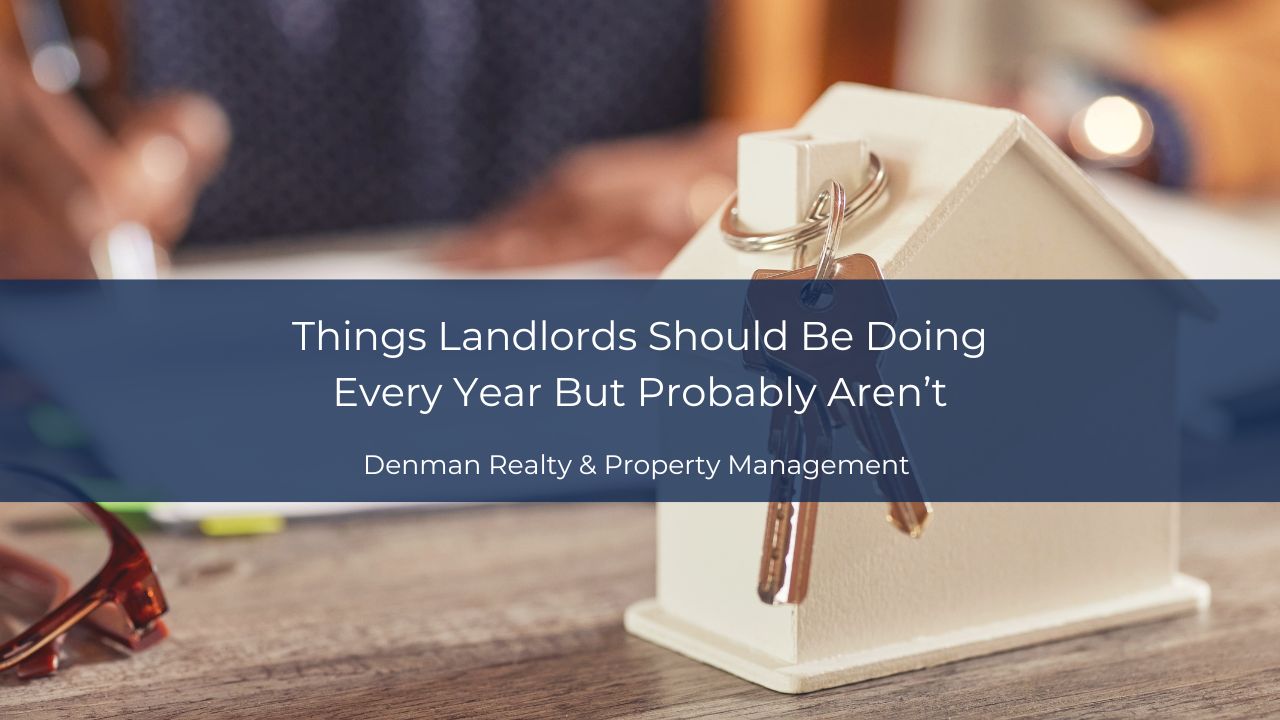Key Takeaways
- Annual Reviews Protect Your Investment – Landlords should regularly update lease agreements, reassess insurance policies, and review rents to stay aligned with legal requirements, market conditions, and property value changes.
- Preventive Maintenance and Inspections Save Money – Yearly property inspections, appliance servicing, and legal compliance checks help prevent costly repairs, uncover hidden issues, and ensure the property remains safe and habitable.
- Tenant and Financial Audits Strengthen Long-Term Success – Conducting tenant satisfaction surveys and auditing financial records each year promotes stronger tenant relationships, reduces turnover, and ensures the rental business remains profitable and organized.
As a landlord, your responsibilities involve more than collecting rents and scheduling maintenance. It entails managing the property in entirety, and ensuring that everything runs smoothly, profitably, and legally.
Although some landlords do a good job staying on top of their daily duties, they run the risk of forgetting several essential tasks that should be performed annually. Though, infrequent, these tasks will help you ensure the rental property runs smoothly, save you money and prevent unnecessary issues.
So what tasks may you inadvertently be neglecting? In this article by Denman Realty and Property Management, we’ll detail vital elements of property management that you may have forgotten about!
Evaluating and Updating Lease Agreements
Using the same lease every year without reviewing it is a mistake. That is because laws change, market situations shift, and tenants evolve.

For that reason, you need to be reviewing your lease agreements every year to ensure that they:
- Account for modifications in occupancy and updates on the property.
- Comply with local and state laws.
- Include new clauses such as short-term subletting or smart device usage.
- Reflect maintenance obligations, pet policies, and current late fees.
Failure to review your lease agreements every year may result in misunderstandings, finical losses, and legal issues.
Performing Yearly Property Inspections
Your lease agreement permits you, as the landlord, to conduct an annual inspection of the property after prior notice. Doing so will benefit both you and the renter. It offers you an opportunity to take notes of neglected maintenance, check for damages, and shows renters that you are serious and proactive.
Look out for the following during this inspection:
- Conditions of the HVAC filter.
- Signs of pest infestations.
- Leaks in the toilets and under sinks.
- Unauthorized alterations or pets.
- Mold and mildew.
- Functionality of the smoke and carbon monoxide detectors.
Review and Reassess Insurance Policies
Insurance policies are very crucial for rental property investments. Companies may modify their policies and you have to keep up with any changes to the terms and conditions. Recent events in your neighborhood may also affect the policy you took.

You need to reassess these policies every year to know:
- If earthquake or flood insurance will be needed for the neighborhood.
- Whether the property’s value is still within the coverage limits.
- In case of a disaster, if loss of rent coverage is included.
- If liability coverage is satisfactory, should a guest or tenant sustain injuries.
You can get these updates by visiting the company's website or calling your insurance agent once a year to avoid losing money.
Reassess Rents
It’s not compulsory to increase rent every year. However, it is a smart strategy to assess whether you should increase rents. You can protect your real estate investment against profit erosion over time through modest annual adjustments in rents.
Conversely, intentionally deciding not to increase the rent may be a strategy to attract long-term tenants, reduce tenant turnover, and vacancy rates. To determine whether or not to increase rent prices:
- Look at similar properties in the area and compare their market rates.
- Factor in tenant retention.
- Consider rising maintenance costs, inflation, and any increase in property tax.
- Ensure that increase in rents comply with notice or rent control laws.
If you’re still unsure what to do, consider various ways you can generate income without raising rent.
Annual Survey to Assess Tenant Satisfaction
While simple, this strategy makes a tremendous impacts by building trust, showing you care, uncovering hidden issues before they escalate, and opening the door to effective communication.

It can come in the form of an email, a quick phone call, or an online survey to find out:
- If tenants planning to renew the lease when it ends.
- If the renter is happy with the services you render.
- If there is any pressing issue that they have not yet reported.
Audit Your Financial Records
Owning a rental property is a business and you should run it like one. As such, at least once every year, run an audit on your rental income and expenses. Always do the following:
- Identify areas that require cost savings.
- Verify records of rent collection.
- Set goals for the next year.
- Make accurate categorizations for deductibles.
- Review repairs and maintenance costs.
Service Major Appliances and Systems
To save money, you should consider preventive maintenance. Although some issues might not be emergencies, ignoring them can become costly issues down the line. At least once every year, schedule routine inspections and maintenance for your:
- Roof and gutters.
- Appliances.
- HVAC systems.
- Fire extinguishers.
- Water heater.
Perform Legal Compliance Checks
Landlord-tenant laws keep evolving. Look for Fair Housing Laws updates, keep an eye on inspection and local registration changes, and review updates in security deposit regulation. You must also ensure compliance with habitability standards and note any changes in eviction laws.

By staying informed you can ensure your rental business remains legally compliant, thus protecting your reputation and investment.
Bottom Line
The truth is that successful landlords make tenants happy, respond fast to maintenance issues, and manage their properties like a business. By engaging in foundational yearly habits you can sustain your business, satisfy tenants, track finances, and stay protected.
If you would like help managing your rental properties, turn to a trusted Mesa property management company today. Contact our excerpts now for information about our services!



